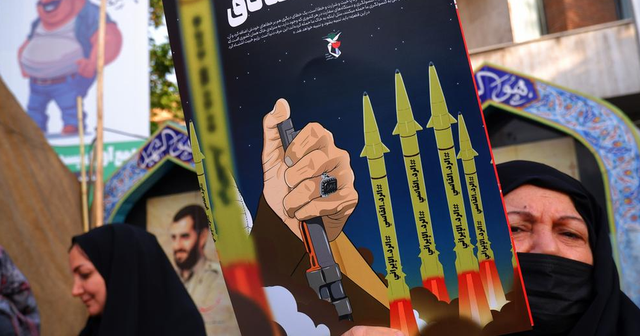
 Flash News
Flash News

For years, Iran has been suffering from high inflation, the weakening of the currency and the consequences of international sanctions. New measures by the West and a long military conflict would put the country in front of a very serious crisis.
At a time when the US and the EU want new sanctions against Tehran, the country itself will stand out with news of success, such as news that Iran has managed to sell more oil than ever before in the last six years. And this despite the US sanctions imposed in 2018 by President Trump. Iran's Oil Minister Javad Ovji announced in March that oil exports have brought more than "$35 billion" to the Iranian state coffers. "Enemies of Iran" want to stop our oil exports, but today we can export oil wherever we want, and this with very good offers, the Financial Times quoted the Iranian minister.
Billions of income are very important for the country to ensure internal social peace. A large part of the population directly suffers the consequences of international sanctions, they have brought about the strong fall of the country's currency, the rial, and increased inflation, up to 40%.
The economics professor at the American University, Virgina Tech, Djavad Salehi-Isfahani, tells DW that the intensification of geopolitical conflicts is exerting new pressure on the Iranian currency, devaluing it even more against the US dollar. In recent months, the rial has lost 25% of its value against the dollar. "This exchange rate depreciation is quickly reflected in much higher prices because Iran imports a lot of goods." According to Salehi-Isfahani, Iran should prepare for a long period of high inflation.
Standard of living as in 2005
Because Iran cannot provide its own food items, the devaluation of the currency and high inflation cause food prices to rise sharply. "This has a strong effect on the well-being of the poorest part of the population, because the provision of food items accounts for half of their expenses," says the expert on the Middle East economy.
But the situation has worsened even for the middle class in the last two decades. "The standard of living is again at the level of 20 years ago because of the sanctions", emphasizes Isfahani. Even the economic volume has this level maybe only a few percent higher, says the expert.
Iran's economic situation is highly dependent on oil exports. Since more than 90% of oil goes to China, Western sanctions are increasingly losing their effect. Therefore, those in power in Tehran are very worried, if the oil sector, which is the main source of foreign exchange, could become the object of an attack as a response from Israel. This is how Isfahani formulates the situation in Tehran. "I'm very sure that they are very worried, because a war that could also damage the infrastructure for oil exports would be a serious blow to the economy." After the shock caused by the sanctions imposed by the US in 2018, Iran has meanwhile again reached 80% of the export amount of the time. But this has not led to the improvement of living conditions for the population, since most of the financial resources go to the military strengthening of the country and other measures of the mullahs' regime.
Corruption and lack of transparency
A lot of money also disappears in the non-transparent structures of the Shiite rulers in Tehran. In Transparency International's corruption perception index, Iran ranks 149 out of 180 countries. Also very unclear is the role of the Revolutionary Guards, a parallel army, and that of religious foundations, which control important parts of the Iranian economy. They do not pay taxes, do not have to present economic balance sheets and are directly dependent on the political and religious leader of the Islamic Republic, Ayatollah Ali Khamenei.
For Middle East expert Martin Beck of the University of Southern Denmark (SDU) Iran's economy consists of a "mix of the political and economic spheres that fosters a politics of clientelism and distribution that is closely linked to corruption."
Although oil revenues have stabilized in recent years, Iran is anything but an economic powerhouse. Although its population of 88 million is nearly 10 times that of its arch-nemesis Israel's 9 million, Iran's economic volume of $413 billion is significantly lower than Israel's, with 525 billion dollars. So how the country's economy will develop depends a lot on the effect of the new Western sanctions, if they would manage to significantly reduce oil exports.
Crucial oil exports
Tehran has managed in the first three months of this year to sell an average of 1.56 million barrels of oil per day, and almost all of it to China. This was the highest value of sales since 2018. "The Iranians have mastered the art of circumventing sanctions," Fernando Ferreira of Rapidan Energy Group was quoted as saying by the Financial Times newspaper. "If the Biden administration is really going to achieve anything here, it needs to focus on China."
The US itself is meanwhile much more independent of oil exports from the Middle East. However, the tightening of sanctions against Iran would lead to an increase in the price of oil in the world markets and would also have consequences in increasing inflation. For President Biden in this election year, this meant opening the door himself to his rival, Donald Trump.
But whether or not the sanctions escalate - Would Iran's economy be ready to handle an escalation of the conflict with Israel? The answer of economics professor Djavad Salehi-Isfahani is clear: "As a whole, it is not ready for a long military conflict. That's why they (those in power in Tehran, ed.) have been very careful not to get too involved in the war of Gaza. And the attack against Israel was more of a symbolic thing than an attack that really wanted to cause damage."/DW
Latest news


Not only the body, swimming also helps the brain
2025-07-05 21:02:49
"Be careful with the water", Alimehmeti warns about the health risks of summer
2025-07-05 20:39:10
PSG beats Bayern Munich 2-0, advances to Club World Cup semifinals
2025-07-05 20:19:38

Two vehicles collide on the Elbasan-Peqin axis, drivers injured
2025-07-05 19:26:29

What does Zelenskyy have more than Zegjineja?
2025-07-05 18:45:26

Fiscal peace, but at a cost
2025-07-05 18:00:10
'Bankers' tax evasion, Chinese CEO and former director jailed
2025-07-05 17:39:21
Kyle Walker joins English club on two-year deal
2025-07-05 17:20:24
Two cars collide on the Saranda-Delvina axis, 4 injured
2025-07-05 17:05:29
Touching gesture! Liverpool will pay Jota's family's salary until 2027
2025-07-05 16:45:18
The zodiac signs that cheat most often
2025-07-05 16:25:53

"I asked for the dismissals", Dredha tries to soften Rama's 'blow' in Vlora
2025-07-05 15:48:49
Bomb threat in Parliament, prosecutor: It was a lie
2025-07-05 15:22:28

Bardhi: The recount revealed how greedy Zeqine Balluku is in stealing
2025-07-05 14:44:29
Knife wound on the secondary road Tirana-Durrës, perpetrator sought
2025-07-05 14:37:54
Tears and pain, Diogo Jota is escorted to his final home
2025-07-05 14:21:34
Success starts with yourself! Simple ways to invest in personal development
2025-07-05 13:58:50
Unlicensed firearms found in apartment, 50-year-old arrested in Lushnje
2025-07-05 13:43:11

Tirana Court remands Skerdi Sina to prison
2025-07-05 12:59:34
Cocaine laboratory in Greece, here are the Albanians arrested and wanted
2025-07-05 12:40:16
Directed Justice/Vangjeli: SPAK does not investigate any scandal involving Rama
2025-07-05 12:22:03

Bomb alert, Police remove MPs and media from Kosovo Parliament building
2025-07-05 11:48:16
"The will of the people" and the irony of ordered resignations
2025-07-05 11:32:05
Summer drowning risk: How to enjoy the water without risking your life
2025-07-05 11:20:27
Fire situation in the country, 16 fires reported in 24 hours, 4 still active
2025-07-05 11:07:04
Car hits pedestrian at white lines, injured in serious condition in Vlora
2025-07-05 10:59:58
Mosquito-borne diseases are a growing problem in Europe
2025-07-05 10:44:13



One of Sweden's most dangerous and wanted criminals arrested in Turkey
2025-07-05 09:38:29
Foreign exchange/ How much foreign currencies are bought and sold today
2025-07-05 09:18:38

"Don't be influenced by the opinions of others", today's horoscope
2025-07-05 08:40:50

Morning Post/ In 2 lines: What mattered yesterday in Albania
2025-07-05 08:02:07

Trump says he's ready to raise tariffs to 70% on some countries
2025-07-04 22:35:52
Tre shenjat e zodiakut që do ‘pasurohen’ në Korrik
2025-07-04 22:05:09
Gaza War: Hamas Accepts US Proposal for 60-Day Ceasefire
2025-07-04 21:50:10
Autocracy in Albania, Fuga: Governance has gotten out of control
2025-07-04 21:40:51
Meta: Agriculture on credit, the new fraud!
2025-07-04 21:26:39




Vote recount in Durrës ends without changes
2025-07-04 20:12:54
Gas station explodes in Rome, 25 injured (VIDEO)
2025-07-04 20:00:20

These afternoon habits often sabotage weight loss
2025-07-04 19:39:28
Former Arsenal player Thomas Partey accused of rape
2025-07-04 19:24:21
Shepherd disappears without a trace in Delvina
2025-07-04 19:14:31

Bardho gave Zegjine's mandate/Braho: Unfair! It violates the electoral system
2025-07-04 19:01:08


Rapid developments in the Sultanates!
2025-07-04 18:00:06



Italy tightens rules for skateboard traffic
2025-07-04 17:20:18

Unusual for the time, dense fog covers the coast of Vlora
2025-07-04 16:48:01


Accident on the Shkodra-Lezhë axis, one dead and 3 injured
2025-07-04 16:14:19
Albania with fewer requests for asylum and Albanian citizenship in 2024
2025-07-04 16:06:57

Albania last for quality of life, DP: Technical government is the solution!
2025-07-04 15:42:30
Nico Williams says "No" to Barcelona, signs with Athletic Club until 2035
2025-07-04 15:33:35
Fires in the country, four fires are still active, what is the situation?
2025-07-04 15:24:20

Summer brings big changes for these 4 zodiac signs
2025-07-04 15:00:04
Osmani: MPs need to agree to a secret ballot for the Speaker of Parliament
2025-07-04 14:51:09
Serious accident on the Peqin-Elbasan axis, two injured
2025-07-04 14:37:56

GJKKO leaves in force the security measure for the head of the KPP
2025-07-04 13:58:17
Who will replace Ilir Meta and take over the leadership of the PL?
2025-07-04 13:50:36
Berisha: Dismissal of directors in Vlora, another act of 'scapegoats'
2025-07-04 13:41:46




Librazhd/ In a serious psychological state, the young man consumes pesticides
2025-07-04 13:05:07


Weapons trafficked from Kosovo to Albania, two arrested, 8 pistols seized
2025-07-04 12:33:28
Konsumimi i tepërt i çokollatës, ja cilat janë dëmet që shkakton në organizëm
2025-07-04 12:23:35

Fires in the country, 21 fires in the last 24 hours, 4 still active
2025-07-04 12:00:19
WB calls for debt transparency: Albania to publish details of every loan
2025-07-04 11:50:05
